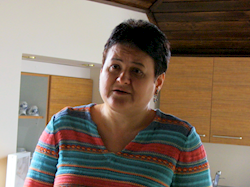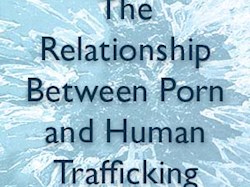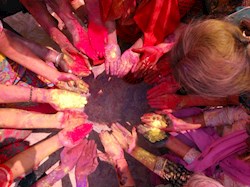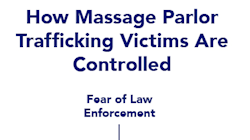Celebrating Women TIP Report Heroes
March 08, 2015
Caleb Benadum
Opinion
�
Women & Girls
They are judges, lawyers, policy makers, politicians, trafficking survivors, social workers, psychologists, law enforcement professionals, and academics. These are the Women of the TIP Report Heroes.
The Decade of Women
“I believe that now, on the eve of a new millennium, it is time to break the silence.”
The words rang out over the crowd gathered in Beijing on September 5, 1995. Excitement and determination rippled through the crowd as Hilary Clinton’s words echoed in the amphitheater. This was the fourth time this group had come together to focus on the rights of women around the world. The Fourth World Conference on Women was in full swing, and it was to be a landmark assembly for women’s rights. The UN-proclaimed “decade of Women” was coming to a close, and the focus was on action. Delegates from around the world were set to discuss how their countries and organizations could act for equality, development and peace. This was a historic moment, a turning point for women’s rights around the world. By remaining true to its own design, the conference’s most important effects have been the actions and conversations that began during those September days.
One conversation had been brewing behind the surface for some time. The 1980s had sparked new interest in a conversation that had been closed since the last international convention in 1949: the trafficking of women and others for the purposes of sexual exploitation. That conversation stretched all the way back to the so-called “white slave trade” of Britain in the late 19th century. But here it was again, and in full force. In fact, the Beijing Conference resulted in several strategic objectives having to do with violence against women. Strategic objective D.3 was the following: “eliminate trafficking in women and assist victims of violence due to prostitution and trafficking.”
In this we see the origin of our present day fight against modern-day slavery. To be sure, there were parallel actors who were beginning to advocate about forced labor issues generally occurring in migrant worker situations. But the movement itself began as part of the women’s movement. So what does this mean? Why is it important that women played such an important role in the genesis of this worldwide movement?
Today is International Women’s Day: March 8, 2015. As we come to this day, and this month, we want to celebrate the incredible women who have brought this issue before the world, and who continue to work behind the scenes to change policy, to prosecute offenders, to help victims, and to prevent human trafficking. They are true Heroes. Recently, on this site, we have honored several incredible women who are TIP Report Heroes: Monica Boseff and Kristina Misiniene. Monica works tirelessly in Bucharest, Romania to care for survivors of sex trafficking. Kristina diligently seeks out survivors and provides them with social services and direct psychological care. Both show an unbelievable amount of compassion and diligence as they work on behalf of women who have been exploited.
Women of the TIP Report Heroes
But we also want to celebrate the other women of the TIP Report Heroes. 58 incredible women, and a collection of nuns in Peru, are celebrated on this site as TIP Report Heroes. Each one has a story to tell, and each one has a history of dedication to the fight against human trafficking. We will continue to tell their stories, the stories of freedom’s heroes, day after day and week after week. Today we focus in on three women who have been honored as TIP Report Heroes, and the story of their work and their lives.
Swati Chauhan is a magistrate in India. She was appointed as the magistrate over Mumbai’s specialized court for trafficking victims in 2008. Mumbai created this court because of a common problem in parts of India: a backlog of cases that could wait years before seeing the inside of a courtroom. However, that all changed for trafficking survivors in Mumbai once Magistrate Chauhan took over the specialized court. Within three years she had worked through the backlog of almost 1500 cases. She had shaped the culture of the court, bolstering victim sensitivity and helping all those involved in the proceedings to better serve the survivor of trafficking. She showed an enormous amount of compassion, sitting and listening to the stories of survivors in her court day after day. She helped over 1200 women and children, convicted over 200 traffickers, and trained over 600 professionals. She is now a judge appointed to a Family Court in Mumbai, showing the same compassion and foresight to the people who come to her court that she practiced while at the specialized court for survivors of human trafficking. Check out her profile!
Maria Grazia Giammarinaro is the Special Representative and Coordinator for Combating Trafficking in Human Beings for the Organization for Security and Cooperation in Europe (OSCE). In her role as a high-ranking official at an International Governmental Organization (IGO), Maria shapes policy that affects countries all over Europe with regards to their laws and their practices. She has honed in on forced labor and domestic servitude, both of which disproportionately affect women, and has begun cracking down on companies who utilize slave labor. Prior to joining the OSCE, she was active in anti-human trafficking policy and advocacy work in her home country of Italy. An intelligent, well-educated, and devoted advocate, she continues to shape policy at a high level, changing the scope of anti-human trafficking work in Europe and around the world. Check out her profile!
Jhinna Pinchi survived a horrific ordeal, transported from a small town to a larger city in the North of Peru and sexually exploited for several years. Like so many, she was enticed with the promise of a job and found, instead, slavery. But her story only began there. After escaping in 2010, she went directly to the authorities. For years she fought a battle in court, at great risk to her own life. Several witnesses who were to testify for her died under mysterious circumstances. This was dangerous territory. Yet she persevered. And her perseverance paid off. In 2013, two of the three people responsible for her trafficking were convicted and sentenced to over a decade each in prison. Equally incredible is this: those convictions were the first convictions of human traffickers in Peru as a country. Check out her profile!
Women’s Rights are Human Rights
“What we are learning around the world is that if women are healthy and educated, their families will flourish. If women are free from violence, their families will flourish. If women have a chance to work and earn as full and equal partners in society, their families will flourish. And when families flourish, communities and nations do as well.”
We do well to remember Hilary Clinton’s words as we march down the path towards ending slavery and forced subjugation. Women play an integral role in every level of society. Several years ago, Nicholas Kristof and his wife Sheryl WuDunn wrote a book titled Half the Sky. The title is a reference to a Chinese saying which states that women hold up half the sky. The Women of the TIP Report teach us an important lesson. In this business, in this fight, women have a special role. In some ways, they hold up most of the sky. Because they can reach out to victims of sex trafficking in a way that men cannot, and they can help women domestic workers in ways that men cannot, and they can address concerns of sexual abuse in migrant worker situations that men cannot. But they can also create policy, or sit as a magistrate on a court. They can write academic articles, like the world-renowned scholar Anne Gallagher. They can run companies and address trafficking concerns in their industries or supply chains, like Marilyn Carlson Nelson. They can operate as law enforcement professionals, like Katrin Gluic or Patience Quaye. They can be union leaders, like Simona Broomes.
What the Women of the TIP Report Heroes have to teach us is this: women play an important and irreplaceable role in the march against slavery. What is more is that they can play any role they want to in this work, and they can do it well. But International Women’s Day is not only about celebrating women, but recognizing that there are still many women who are oppressed, or not allowed to fully participate in society the way many of the TIP Report Women can. Today, as we think about International Women’s Day and what that means for our societies and for the world, let us remember the words of Hilary Clinton—and the actions of these incredible women—and say only this: if we truly want to eradicate slavery then our governments, our civil society, and our communities must allow women to stand up and take the lead in this fight.
This article was originally published on tipawards.org
Topics:
Women & Girls












